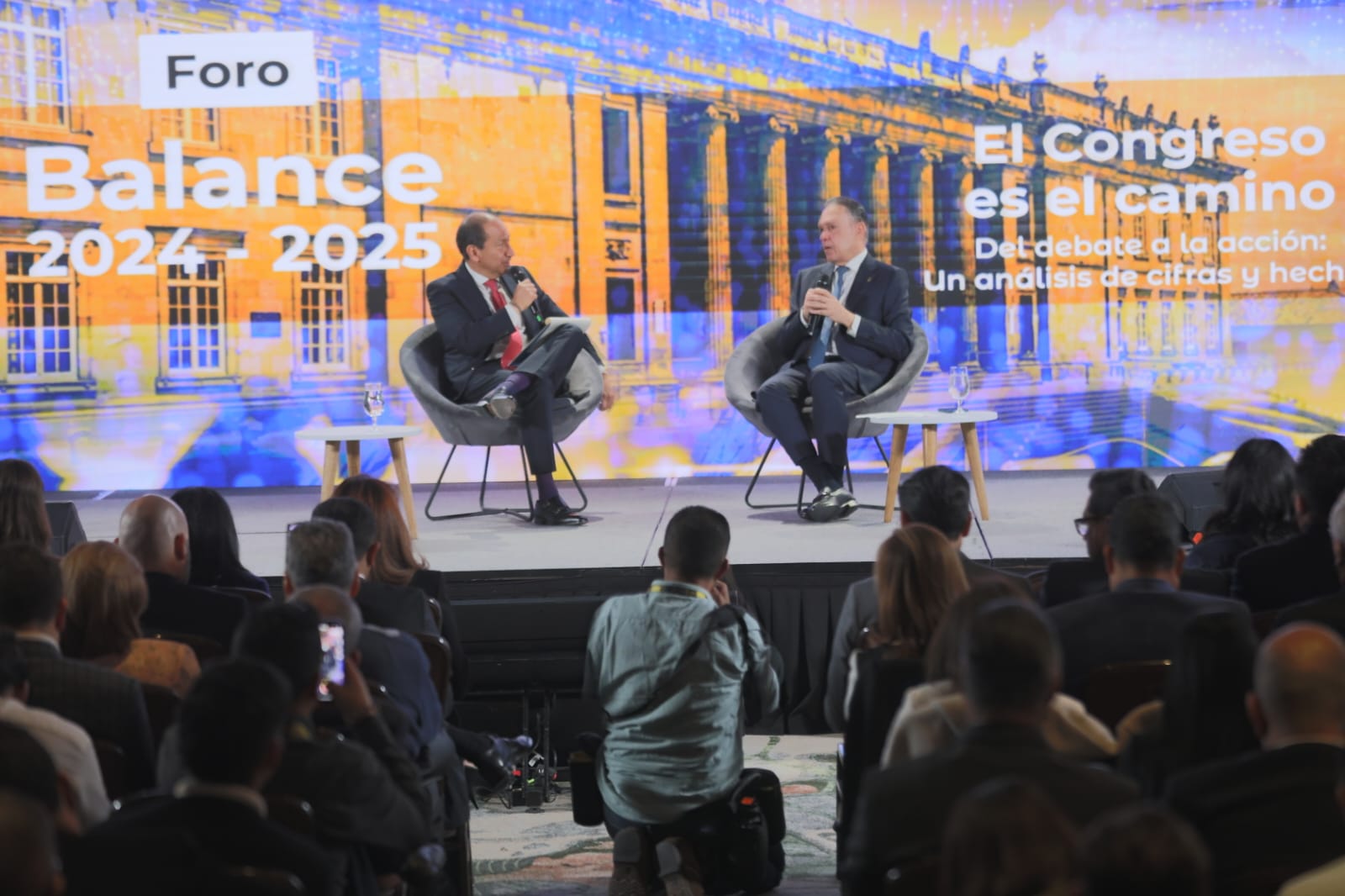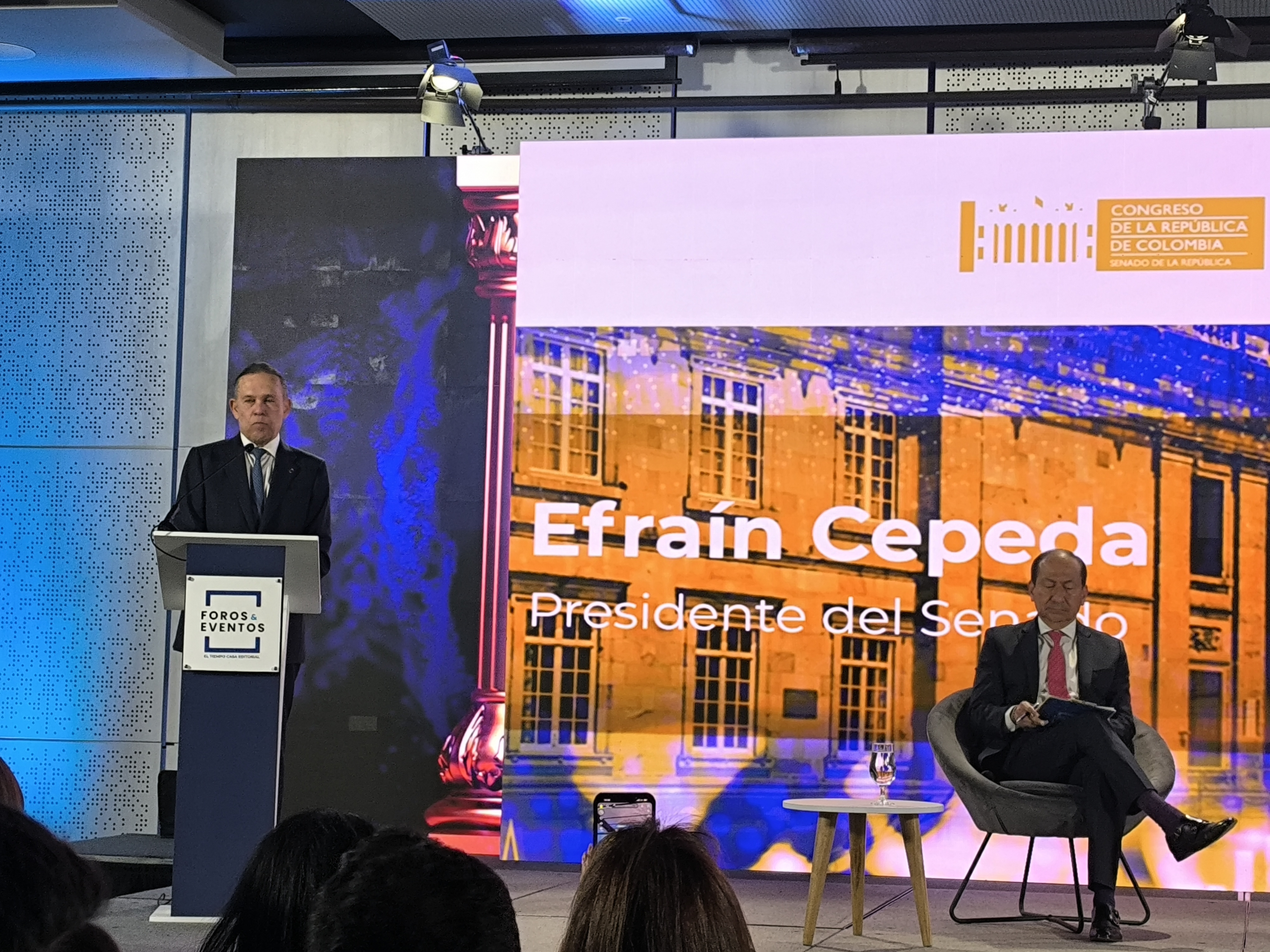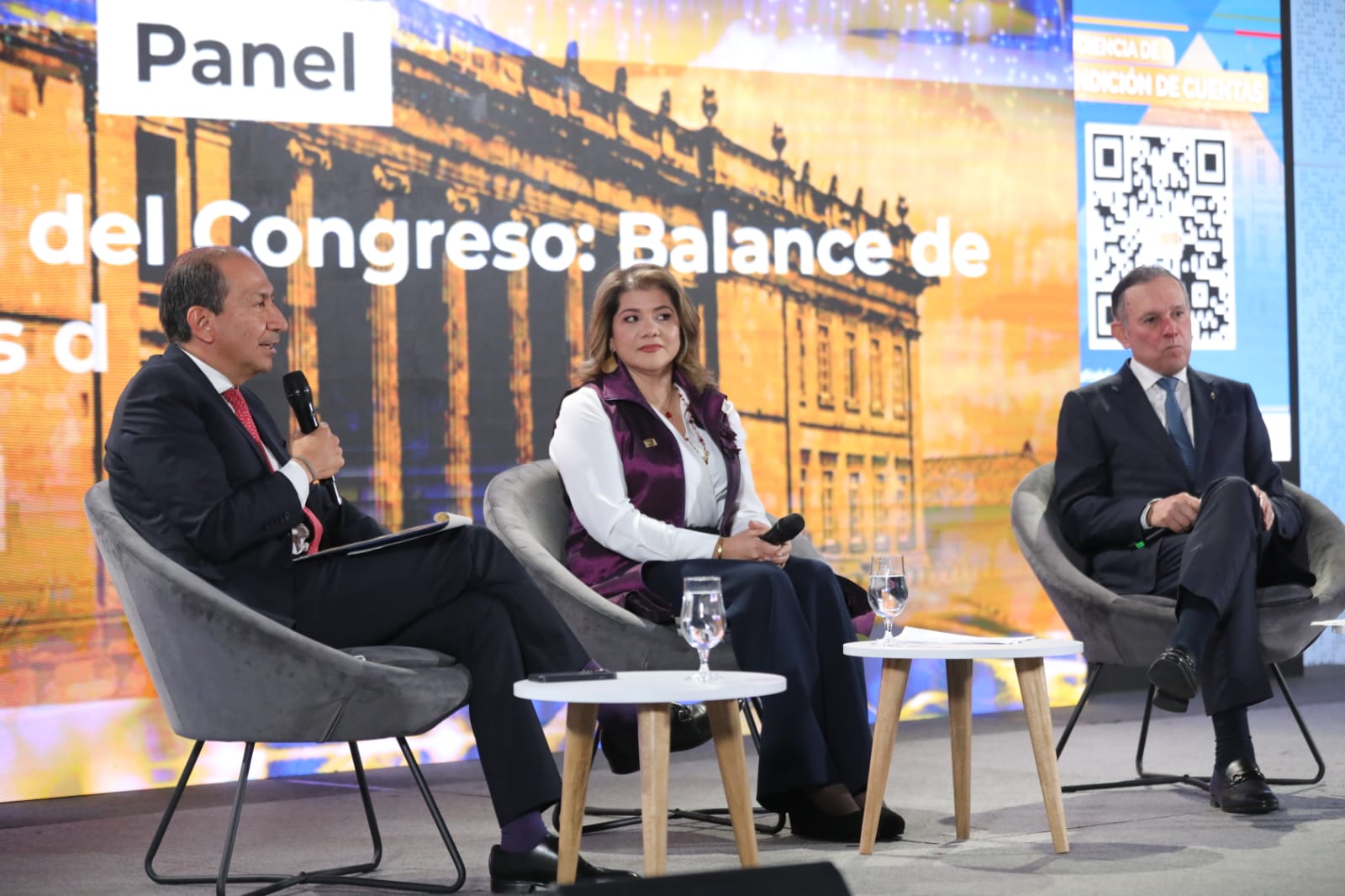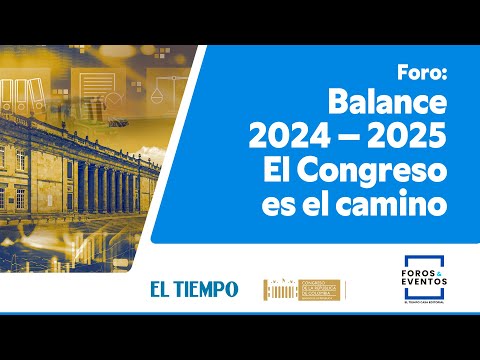'Until the very last day, we have defended the independence of powers': Efraín Cepeda during his year-long review of Congress

"Defense of the 1991 Constitution and democracy" was the focus of the Senate's management review of the third term, held yesterday at the EL TIEMPO forum and the Senate of the Republic. The president of the corporation, Efraín Cepeda (Conservative Party); the first vice president, Lorena Ríos (Just and Free Colombia); the secretary, Diego Alejandro González; and the rest of the board members emphasized that, despite pressure from President Gustavo Petro, the Legislature demonstrated its independence from the first sessions of the term until the last day, June 20, when they voted on the conciliation of the labor reform.
"Democracy thrives despite the attacks against it," was the central message of Efraín Cepeda, who gave his assessment in an interview with Andrés Mompotes, the general director of this publishing house. In this regard, he said it was a period of great challenges given the positions taken by the Executive Branch. In this interview, he spoke of the difficulties faced by a presidential stance that even escalated into insults and disregard for the independence of branches of government.

Senate President Efraín Cepeda, taking stock of the year. Photo: Milton Diaz / EL TIEMPO
According to the current head of the Senate, the President assumed functions that belong to the Judicial and Legislative branches, resulting in a breakdown in the separation of powers. "Never in my 30-year political career have I seen such a lack of knowledge of the 1991 Constitution," she noted. However, she asserted that the unity demonstrated by the Legislature made it possible to overcome these challenges.
“Everyone played a role in safeguarding democracy,” said Senator Efraín Cepeda, highlighting those who supported him during his year at the helm of the Senate. For example, he emphasized what happened during the first referendum vote, which even saw verbal attacks against Secretary González. “Despite the attacks he faced, he defended democracy. His voice didn't waver when announcing the results,” Cepeda emphasized. Everyone agreed that this episode was one of the semester's greatest challenges.
The conservative senator began with what happened during those tense days to emphasize that the independence of branches worked during the legislative year and allowed for the advancement of more structured proposals than those initially submitted. "We can't assume that Congress is a notary of what the executive branch thinks. We've reached agreements with every government; each party has a banner and a proposal that generally enriches the process."

Senate President Efraín Cepeda during his report. Photo: Juan Sebastián Lombo DELGADO
Lorena Ríos, First Vice President, who participated in another segment of the conversation, also highlighted the stance the legislature took in response to the government's intentions. She noted that events such as the "decree" demonstrated an attempt to impose the agenda from the executive branch, but, she said, "there was leadership to build consensus. The legislative groups were reassured."
Ríos emphasized that the Senate has been seeking alternatives to the polarization facing the country. "In these dialogues, fundamental steps have been taken to build consensus and the attacks have been put aside. These have been high-level consensuses."
The senator not only spoke about the work of the board of directors, but also noted that during this legislative year, which ended on June 20, "serious work was done on social reforms." Ríos emphasized that the observations they made, such as the lack of fiscal support, led to better implementation of the projects. She concluded: "We don't want imposed reforms; we are not anyone's notaries."
The Secretary's Vision Senate Secretary Diego Alejandro González also provided a snapshot of the legislative year in figures (see chart). He highlighted that more than 25 bills introduced in the legislature were approved and emphasized that not only was there time to debate the government's proposed reforms, but there was also room for the congressmen's agenda.

Senate Vice President Lorena Rioa and Senate President Efraín Cepeda. Photo: Milton Diaz / EL TIEMPO
Faced with the tensions inherent in the semester, he said the Senate demonstrated that "strong institutions are designed to function with strong human capital." However, he addressed the limitations they have faced due to a lack of staff. "Limited resources mean limited staff. We are concerned that the limitations will not allow us to cope," the secretary said.
Astrid Salamanca, administrative director, also addressed this same topic in another section of the accountability report: "The funds arrived at the end of March, and they arrived in September for the second half of the year. We started without any money. We worked with our regular staff, which is minimal. With a minimal staff, we managed to keep the Senate from coming to a standstill."
The most tense days of the third year During the Senate's leadership presentation, the Senate president and the rest of the Senate agreed on the challenge to democracy represented by the days surrounding the referendum and President Gustavo Petro's decision to ignore the "no" vote. All of these events indicated that these were the most difficult moments of the legislative session. "President Petro decided to assume not only the executive branch, but also the legislative and judicial branches," was how Efraín Cepeda described what happened during those days.
"He bypassed the legislature, but if he had any doubts, he should have gone to the judiciary, and he also bypassed the judiciary and simply signed the so-called 'decree,'" Cepeda added, regarding his view of those days. Lorena Ríos also commented on what had happened during those days and questioned the government's strictures. She emphasized that the government could not expect senators to act as notaries of the executive branch's will during those days.
Secretary Diego González gave his own account of those days, as his clarification of a vote served as an argument for the Executive Branch to claim the process was irregular, and as the basis for issuing what became known as the "decree-law." "I have shown that all processes are transparent. The secretary's role in the consultation was to collect the votes and announce them. It was incorrect for me to have changed the senator's vote. What would have been wrong was not having honored the vote."
Along those lines, the secretary commented that he understood what happened in the session in which the Minister of the Interior confronted him: "I have also known the Minister for many years, and I think it was, for me, more like a reaction of helplessness, of frustration at not being able to move forward with this, but my duty was to stand on the side of truth and transparency, and that is what was done."
In that conversation, the Senate Secretary revealed that, thanks to these incidents, they have had to respond to various judicial processes. "I don't have a single judicial process against me. Yes, I want to tell you that we have a large number of actions taken against the Senate; for example, more than 62 tutela actions that we have responded to and that have been ruled in favor of the Senate of the Republic, more than 58 petitions for rights that have also been filed as a result of this issue, three nullity actions currently pending before the Council of State. Of these, two precautionary measures were filed by the plaintiffs that were not accepted by the Council of State, and currently an action for constitutional review by the Supreme Court of the famous 'decretazo', in which they have asked the Senate and the Secretariat to render a report on how the process was carried out in that day's session."

The Senate's balance sheet. Photo:
Juan Sebastian Lombo Delgado
eltiempo





